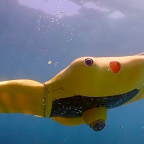
On December 9, 2007, the ice-breaking research vessel Polarstern will celebrate her 25th anniversary of service: since 1982, the world’s most powerful polar research vessel has been venturing to the Arctic and Antarctic on behalf of the Alfred Wegener Institute for Polar and Marine Research, part of the Helmholtz Association.
7600 scientist from 36 nations have gained insights into the polar oceans aboard Polarstern, facilitating our current understanding of the earth as a system. Polarstern provides ideal working conditions for international and interdisciplinary research teams and offers safe transport in polar seas.
Currently, Polarstern is on her way to the Antarctic as part of the International Polar Year 2007/08. The birthday celebration for Polarstern will take place on November 28 at the Museum of Natural History in Berlin, and will include a special address by Chancellor Dr Angela Merkel.
The international research community owes a vast amount of knowledge to the operation of Polarstern, e.g. concerning past climate and the largely unexplored deep sea.
The largest German research vessel was funded by the then Federal Ministry of Education and Research, and is operated by the Alfred Wegener Institute for Polar and Marine Research.
“For 25 years, expeditions aboard Polarstern have been producing scientific results which have significantly advanced our understanding of important parts of the earth as a system”, says Prof Dr Karin Lochte, Director of the Alfred Wegener Institute.
Polarstern expeditions are designed as international and interdisciplinary ventures in order to enhance insights into the polar regions through optimal scientific exchange and data gain.
Polarstern can accommodate up to 55 scientists, who, aside from being provided with a bunk, have access to modern laboratories, aquaria and measuring equipment, but are also able to bring their own instruments or work around the clock.
During extended research voyages to the polar regions, Polarstern must be entirely self-sufficient, with the crew being able to carry out even complicated repairs independently. Polarstern not only represents a floating laboratory, it also supplies Neumayer Station in the Antarctic, which is operated year round, with food, materials and fuel.
Polar research is climate research
Despite the tremendous significance of polar regions for the climate and comprehensive research activities in the past, many questions about polar oceans remain unanswered.
It takes a reliable logistical infrastructure to travel to and study such inhospitable regions. Polarstern is the only vessel in the world to enable directed research in polar oceans year round.
“Only if we have long-term data from these limited-access regions, will we be able to recognise changes and make predictions for the future. The data collected from oceans, sea ice and from the atmosphere above, allows international teams of scientists to construct models which we will need to adapt to future living conditions on our planet”, says Dr Eberhard Fahrbach, scientific coordinator of the Polarstern expeditions.
In order to facilitate participation by the general public and future young scientists in polar research, individual Polarstern voyages are occasionally accompanied by media representatives, teachers and artists.
University students and PhD candidates regularly join Polarstern in order to get to know the practical aspects of polar research and to collect important data for diploma and doctoral research.












Social Profiles